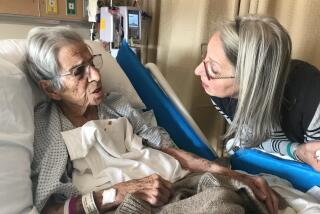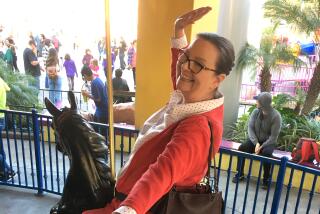‘Living Your Life to Fullest Though Days Are Limited’
- Share via
When her grandmother died in an impersonal hospital room after a long illness, Lena Beker vowed to help terminally ill people die in the comfort and security of familiar surroundings.
In December, six years later, the former textile industry executive opened the nonprofit Roze Room hospice, named in honor of her Russian immigrant grandmother, Roza Litvak.
Beker, 28, has put all her savings into the hospice program, which sends a nurse, social worker, chaplain and other staff to wherever the dying person calls home, be it a house or nursing facility.
At her former job as a textile company’s director of sales and marketing, “It was all about money, it was all about the yardages you sold,” she said. “Here, it’s not about the money you make. . . . Hospice is about living your life to the fullest even though your days are limited.”
When she talks about her new life’s passion--nurturing dying people and their families--Beker says people often tell her she’s too young for the kind of work she’s doing.
“I smile at that because, I mean, how old do you have to be to want to do this?” Beker said.
Beker estimates that she and her husband, an attorney, have spent about $300,000 to get the Roze Room running and to help about 20 patients. So far, patients have not had to pay any costs themselves, even though treatment may include medications and the services of nurses and home-health aides.
In June, the Roze Room received certification from Medicare officials, so Beker can be reimbursed for the care she and her staff provide.
When Beker quit her job two years ago, she set out to establish an inpatient facility for those approaching death. She wanted her hospice to be in West Hollywood, where her family had settled when they immigrated from Kiev in 1979, and where her grandmother had taken care of her while her parents were at work.
After four months of searching, she found a little house on Martel Avenue which seemed perfect. She renovated it into a facility accommodating five patients, hired a medical director and other staff, obtained a license from the state Department of Health Services, and held an opening celebration last December.
Then, in January, state officials told her there had been a mistake. The Roze Room was too close to another congregate health care facility. Beker’s operating license was not renewed.
Though the setback rattled Beker, it allowed her to rethink her mission. She rented out the house on Martel and restructured her business to serve patients in their own homes.
“Now we can reach the many that need our services instead of being limited to the five,” Beker said. “My goal is to help the people out there that need us most. And to do it on a larger level is a gift.”
Most of the 59 licensed hospices in Los Angeles County operate similarly, according to officials at the California State Hospice Assn. in Sacramento.
“People expect to die in a hospital with a lot of tubes,” said Marcia Cooper, the Roze Room’s director of nursing. “When we tell them they can do it at home, in their own environment, and we will help teach [the family] to take care of people, they’re happy.”
The company works with patients diagnosed as having less than six months to live, who are within a 30-mile radius of the group’s offices on Wilshire Boulevard’s Miracle Mile. Any farther away and staff would have trouble living up to their promise to be available to patients and families 24 hours a day.
The Roze Room’s staff includes chaplain and volunteer coordinator Reuben Beckham, medical director and oncologist Dr. Frederick Rundall, a social worker, nurses and volunteers.
The group works to keep people dying of cancer, Alzheimer’s, AIDS and other illness comfortable, attending to their social and spiritual needs, and preparing family members for the death. Because staff and volunteers visit frequently, they often develop close relationships with patients and their families.
“After 30-some years [as a nurse], this is the most intimate encounter that I have ever had in my life,” Cooper said.
Beker, although she’s had interest from investors, wants to keep her company small enough that she can oversee every detail. Her challenge now is to reach doctors and nurses who will tell patients about her program.
“I feel a sense of fulfillment in my life now, where I didn’t feel the same in the apparel industry,” Beker said. “It’s exciting to get letters from families and doctors saying, ‘You’re doing a great job, keep it up.’ . . . They’re actually thankful for our being there.”
More to Read
Inside the business of entertainment
The Wide Shot brings you news, analysis and insights on everything from streaming wars to production — and what it all means for the future.
You may occasionally receive promotional content from the Los Angeles Times.










